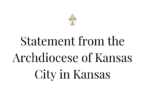Kansans urged to contact legislators to override governor’s veto
by Joe Bollig
joe.bollig@theleaven.org
KANSAS CITY, Kan. — Pro-life leaders expressed dismay over Gov. Mark Parkinson’s veto of a late-term abortion bill and urged Kansans to contact legislators and ask for a veto override.
On April 15, Parkinson vetoed Senate substitute for House Bill 2115. The bill passed the House 83 to 36, and the Senate passed it 24 to 15.
The bill would have required that doctors provide a specific medical diagnosis when they perform an abortion on viable unborn children past 22 weeks of gestation. It also would have tightened requirements for referring physicians, revoked physicians’ licenses following convictions on certain misdemeanors, and allowed lawsuits by family members against doctors who violate the law.
Kansas bans late-term abortions on viable babies, but allows them with exceptions for serious medical reasons. For years pro-life leaders have pointed out that doctors performing late-term abortions in Kansas have refused to provide specific diagnoses and merely repeated the law’s language in order to fulfill reporting requirements called for in exist- ing law.
“It was a very disappointing decision by the governor,” said Archbishop Joseph F. Naumann. “I think [this legislation] was an effort to ensure that Kansas does not again become a center for late-term abortions in the Midwest. It’s difficult to understand the governor’s rationale.”
In his veto message, Parkinson said that Kansas’ current late-term abortion law, passed in 1998, “strikes a reasonable balance on a very difficult issue.” He further said he supports the current law and believes that “an annual legislative battle over the issue is not in the public’s best interest.”
“This legislation was geared toward post-viability, late-term abortions,” said Michael Schuttloffel, executive director of the Kansas Catholic Conference. “We’re talking about unborn children who are [slightly more than] five months. Anyone who has seen a sonogram of a 22-week-old unborn child couldn’t be against legislation like this.”
The pro-life organization Kansans for Life called the governor’s veto message a “disingenuous excuse.”
“It is completely disingenuous for the governor to say that it is a good law and fail to point out that he doesn’t believe in enforcing the provisions of the law,” said Mary Kay Culp, executive director for Kansans for Life.
Kansas has good late-term, post-viability abortions laws, said the archbishop, but they have not been enforced.
“We have the strictest law, but we’ve had the most late-term abortions because our law is not enforceable without this companion legislation,” said Archbishop Naumann.
Ron Kelsey, archdiocesan pro-life consultant, agreed that Parkinson’s veto statement ignored the problem of non-enforcement.
“”[The governor] ignores the fact that there is no effective enforcement of laws regulating late-term abortions in Kansas,” he said. “In other words, there is nothing that prevents late-term abortions in Kansas.”
The governor vetoed HB 2115 only two days after Nebraska passed two laws restricting abortion. Pro-life leaders fear these actions will give incentive to Nebraska abortionist Leroy Carhart, who worked with the late George Tiller, to establish a practice in Kansas.
For years, Kansas served as a major destination for anyone seeking a no- questions-asked late-term abortion, said Schuttloffel.
“Kansas has developed a reputation as a uniquely hospitable political and legal environment for abortionists that specialize in the kind of grisly, late-term abortions that other states will not allow,” said Schuttloffel.
“Governor Parkinson’s action . . . only reinforces that perception,” he continued, “and, taken in concert with the new Nebraska law, stands as a veritable invitation to notorious abortionist Leroy Carhart to relocate his business to our state as he has sometimes considered.”
Kelsey urged Kansans to contact their legislators and ask that an attempt be made to override the governor’s veto. To do this would require only one more vote in the House, and three in the Senate.
The Legislature is now in recess and will return on April 28 for a roughly two- week-long wrap-up session.






